Civil Society Theory and Euro-Nationalism - University of Sussex
Civil Society Theory and Euro-Nationalism - University of Sussex
Civil Society Theory and Euro-Nationalism - University of Sussex
Create successful ePaper yourself
Turn your PDF publications into a flip-book with our unique Google optimized e-Paper software.
CIVIL SOCIETY THEORY AND EURO-NATIONALISM<br />
Gellner’s work has been described as ‘explicitly, brazenly <strong>and</strong><br />
unashamedly functionalist’ 56 <strong>and</strong> the first three adjectives at least<br />
can be applied to his belief in the market economy. However, the<br />
notion <strong>of</strong> ‘civil society theory’ being developed here emphasises<br />
the process <strong>of</strong> reception in which extrapolations are made <strong>and</strong><br />
reductive assumptions read in. This means that work capable <strong>of</strong><br />
more ambiguous interpretation is also recycled within civil society<br />
theory as rhetoric in support <strong>of</strong> positions which the authors<br />
themselves might oppose. Jürgen Habermas is a case in point.<br />
Habermas, a major point <strong>of</strong> reference in the contemporary civil<br />
society debate, has been described as ‘the intellectual conscience<br />
<strong>of</strong> the left wing <strong>of</strong> the SPD’. 57 His role as an internationally<br />
recognised academic, whose work is then recycled in political<br />
debate, is in some ways comparable to that <strong>of</strong> Anthony Giddens<br />
as advisor to New Labour. In his <strong>Theory</strong> <strong>of</strong> Communicative Action 58<br />
Habermas uses the terminology <strong>of</strong> ‘lifeworld’ <strong>and</strong> ‘system’ to<br />
distinguish communicative rationality, requiring both honesty <strong>and</strong><br />
trust, from the strategic rationality <strong>of</strong> the market. Parallels can be<br />
drawn with Hegel’s schema <strong>of</strong> the cohesive patriotism <strong>of</strong> the nation<br />
<strong>and</strong> the centrifugal force <strong>of</strong> civil society set out above, <strong>and</strong> again<br />
the way in which these aspects are recomposed to form a general<br />
description <strong>of</strong> society is crucial.<br />
Habermas warns that the lifeworld can be ‘colonised’ by the<br />
strategic rationality <strong>of</strong> the system embodied in money <strong>and</strong> power.<br />
One form which this could take would be an instrumental <strong>and</strong><br />
opportunistic use <strong>of</strong> patriotism. To avoid this he insists that the<br />
lifeworld cannot be reduced to the empirically observable. In other<br />
words, no specific nation or essential identity can provide the<br />
content <strong>of</strong> the lifeworld. This maintains the theoretical coherency<br />
56 B. O’Leary, ‘Ernest Gellner’s diagnosis <strong>of</strong> nationalism: a critical overview’, in<br />
The State <strong>of</strong> the Nation, ed. John A. Hall. Cambridge: Cambridge <strong>University</strong><br />
Press, 1998, p. 51.<br />
57 D. Schecter, ‘The functional transformation <strong>of</strong> the political world: reflections on<br />
Habermas’ in Studies in Social <strong>and</strong> Political Thought, no. 1, June 1999, pp. 33-49.<br />
58 Two volumes, Boston: Beacon Press, 1984 <strong>and</strong> 1987.<br />
49
















